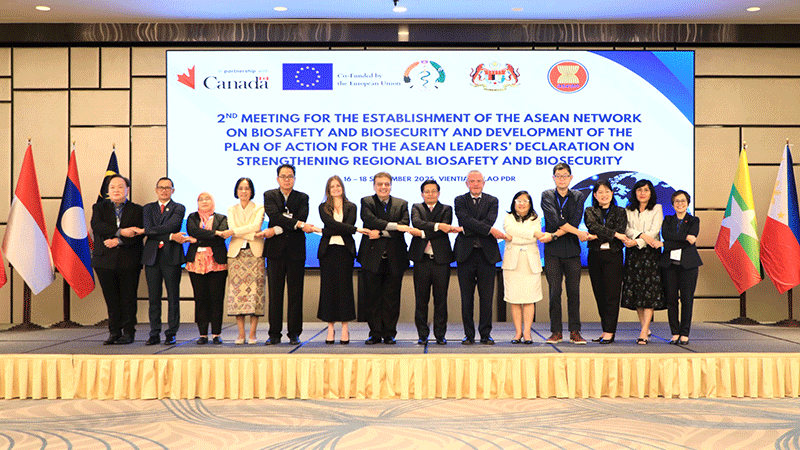 |
| ASEAN health officials gather in Vientiane for talks on biosafety and biosecurity. |
ASEAN nations move forward with plan to combat biological threats
In a significant step towards bolstering regional health security, senior health officials from ASEAN member states and partner countries are meeting in Vientiane to finalise the Plan of Action for the ASEAN Network on Biosafety and Biosecurity.
The three-day meeting is part of the region-wide effort to prepare for and respond to future biological threats.
The meeting will finalise a concrete Plan of Action to implement the ASEAN Leaders’ Declaration on Strengthening Regional Biosafety and Biosecurity.
Participants will discuss the role and responsibilities of the ASEAN Network on Biosafety and Biosecurity, defining and prioritising regional activities and identifying the lead implementers and partners for the Network’s Action Plan.
This includes outlining the next steps for implementation of the Action Plan and preparing for the first official meeting of the Network.
The meeting underscores the need to strengthen health security in the ASEAN region.
The Action Plan will serve as a key reference document for the execution of the ASEAN Leaders’ Declaration, a commitment adopted during the 44th and 45th ASEAN Summits held in Vientiane in 2024.
Opening the session, Director General of the Department of Communicable Disease Control under Laos’ Ministry of Health, Dr Phonepadith Xangsayarath, said “This meeting provides us with an important platform to further strengthen collaboration on laboratory systems, biosafety, and biosecurity across the ASEAN region.”
The gathering is a follow-up to the 1st Consultative Meeting held in Kuala Lumpur in July this year, when the Terms of Reference for the Network were established.
Over the next three days, participants from ASEAN member states and Timor-Leste will provide feedback to ensure the Action Plan is comprehensive and unified across the region.
This collaborative approach will identify specific activities and assign lead and partner countries for each area of work, ensuring a collective effort to prevent, detect, and respond to biological threats.
Dr Phonepadith expressed sincere appreciation for the generous financial and technical support from Canada’s Weapons Threat Reduction Programme and the European Union’s CBRN Centres of Excellence, which made the meeting possible.
He added that Laos was honoured to co-lead this important initiative with Malaysia and reaffirmed the country’s “strong commitment to contributing actively throughout this process” for a safer and more secure ASEAN community.
By Phetphoxay Sengpaseuth
(Latest Update September 17, 2025)
|


